Friends, if you’re searching for “Bible Verses About Do Not Argue With A Fool,” this content is for you. Today, I share Bible verses that can really help you better understand this topic according to the Bible. These scriptures offer wisdom on dealing with foolish arguments and why it’s often best to avoid them. Let’s explore what the Word says about not engaging in fruitless debates with those who lack wisdom or refuse to listen to reason.
Contents
- 1 What Does the Bible Say About Arguing with Fools?
- 1.1 Proverbs 29:9 – Engaging a fool leads to chaos and frustration
- 1.2 Proverbs 18:2 – Fool delights in expressing opinions, not understanding
- 1.3 Ecclesiastes 10:14 – Foolish words increase, no one knows the future
- 1.4 Matthew 7:6 – Do not waste wisdom on those who reject it
- 1.5 2 Timothy 2:23 – Avoid foolish and ignorant disputes
- 2 Proverbs 26:4-5: The Paradox of Answering a Fool
- 3 Key Bible Verses About Not Engaging in Foolish Arguments
- 3.1 Titus 3:9 – Avoid foolish disputes and arguments
- 3.2 2 Timothy 2:16 – Avoid godless chatter; leads to ungodliness
- 3.3 Proverbs 14:7 – Avoid foolish arguments; walk away from senseless conversations
- 3.4 Proverbs 17:12 – Avoid confronting a fool’s folly
- 3.5 Matthew 15:14 – The blind leading the blind, both fall in ditch
- 3.6 1 Timothy 6:4 – Conceited, ignorant disputes lead to envy and strife
- 4 How to Identify a Fool According to Scripture
- 5 Why Does God Tell Us to Avoid Arguments with Fools?
- 6 Biblical Wisdom for Dealing with Difficult People
- 6.1 Romans 12:18 – Live peacefully with everyone, if possible
- 6.2 Colossians 3:13 – Forgive others as the Lord forgave you
- 6.3 Ephesians 4:2 – Humility, gentleness, patience, love, and bearing with others
- 6.4 Matthew 5:44 – Love and pray for your enemies
- 6.5 Proverbs 15:1 – Gentle response calms, harsh words provoke anger
- 7 When Should Christians Choose Silence Over Debate?
- 8 Practical Applications of These Bible Verses in Daily Life
- 8.1 Philippians 4:5 – Let your gentleness be evident to all
- 8.2 Colossians 4:6 – Speak graciously, seasoned with wisdom
- 8.3 1 Peter 3:15 – Defend faith with gentleness and respect
- 8.4 Galatians 5:22-23 – Cultivate the Spirit’s fruits: love, joy, peace, patience
- 8.5 Proverbs 16:24 – Kind words bring healing and sweetness
- 8.6 James 3:17-18 – Wisdom is pure, peace-loving, considerate, and sincere
What Does the Bible Say About Arguing with Fools?
Friends, sometimes we face situations where arguing seems unavoidable, especially with those who may not see things clearly. The Bible offers wisdom, guiding us on when to step back and avoid futile debates. It’s about choosing peace over conflict and remembering that not every battle is ours to fight. Let’s explore the verses that shed light on this important aspect of our spiritual journey.
Proverbs 29:9 – Engaging a fool leads to chaos and frustration

If a wise man contendeth with a foolish man, whether he rage or laugh, there is no rest
Proverbs 29:9
Explanation:- Engaging with a fool results in chaos and frustration, as they neither embrace wisdom nor seek resolution. Their arguments lead to endless disputes without progress, highlighting the futility of reasoning with those unwilling to understand or learn.
Proverbs 18:2 – Fool delights in expressing opinions, not understanding

A fool hath no delight in understanding, but that his heart may discover itself
Proverbs 18:2
Explanation:- This verse highlights the futility of engaging with someone more interested in sharing their own views than in seeking wisdom or understanding. It cautions against arguing with those who prioritize self-expression over genuine insight, as such interactions often lead nowhere.
Ecclesiastes 10:14 – Foolish words increase, no one knows the future
A fool also is full of words: a man cannot tell what shall be; what shall be after him, who can tell him?
Ecclesiastes 10:14
Explanation:- This verse highlights the futility of arguing with fools, as they speak endlessly without knowledge, and no one can predict what lies ahead. Engaging in such debates is pointless, as their words lack wisdom and insight into the future.
Matthew 7:6 – Do not waste wisdom on those who reject it

Give not that which is holy unto the dogs, neither cast ye your pearls before swine, lest they trample them under their feet, turn again rend you
Matthew 7:6
Explanation:- This verse advises against sharing valuable insights with those unwilling to appreciate or understand them. Engaging in futile arguments with those who reject wisdom can lead to frustration and misunderstanding. Instead, it encourages discerning when to share wisdom and when to remain silent.
2 Timothy 2:23 – Avoid foolish and ignorant disputes
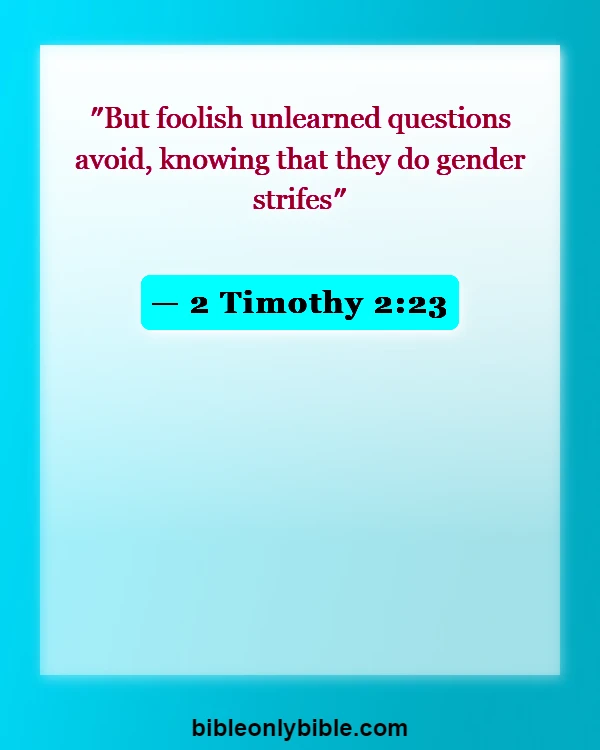
But foolish unlearned questions avoid, knowing that they do gender strifes
2 Timothy 2:23
Explanation:- This verse advises against engaging in pointless and uninformed arguments, as they only lead to strife and conflict. It encourages focusing on meaningful dialogue and wisdom, rather than getting entangled in disputes that lack substance and understanding.
Proverbs 26:4-5: The Paradox of Answering a Fool
My friends, these verses remind us of the delicate balance in dealing with foolishness. Sometimes, silence is the wisest response, but other times, speaking up can prevent greater folly. It’s a divine paradox, teaching us discernment and patience. As we navigate these moments, let’s seek God’s guidance to know when to speak and when to hold our peace.
Proverbs 26:4 – Do not engage with foolish arguments
Answer not a fool according to his folly, lest thou also be like unto him
Proverbs 26:4
Explanation:- This verse highlights the wisdom in not engaging with foolish arguments, as doing so may bring you down to the level of the fool. It underscores the importance of discernment, choosing when to speak and when to remain silent to avoid pointless disputes.
Proverbs 26:5 – Correct fools, or they become wise in their eyes
Answer a fool according to his folly, lest he be wise in his own conceit
Proverbs 26:5
Explanation:- This verse highlights the delicate balance in dealing with foolishness. It suggests that while engaging with a fool can be challenging, offering correction is necessary to prevent them from becoming self-assured in their misguided ways. It’s about discerning when and how to respond wisely.
Key Bible Verses About Not Engaging in Foolish Arguments
Dear ones, debates can be tempting, especially when we feel the need to defend our beliefs. However, the Bible advises us to avoid pointless arguments, reminding us that engaging with folly often leads nowhere. Instead, let’s focus on conversations that uplift and encourage, steering clear of disputes that only drain our spirit.
Titus 3:9 – Avoid foolish disputes and arguments
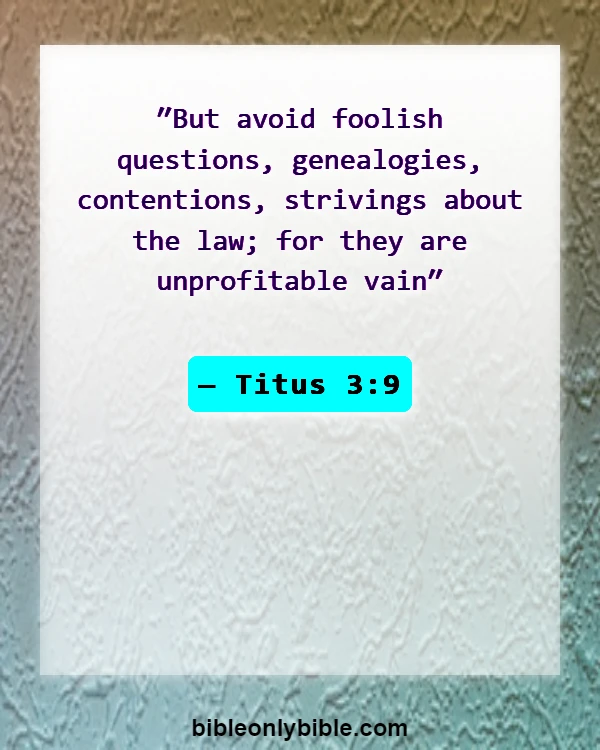
But avoid foolish questions, genealogies, contentions, strivings about the law; for they are unprofitable vain
Titus 3:9
Explanation:- This verse advises believers to avoid pointless debates and disputes over unimportant matters, as they are unproductive and distract from faith’s core principles. Engaging in such arguments can lead to division and strife, rather than promoting understanding and unity.
2 Timothy 2:16 – Avoid godless chatter; leads to ungodliness

But shun profane vain babblings: for they will increase unto more ungodliness
2 Timothy 2:16
Explanation:- Avoiding godless chatter helps prevent the spread of ungodliness. Engaging in foolish arguments often leads to unnecessary strife and distractions from spiritual growth. By steering clear of such discussions, one maintains focus on righteous living and fosters a peaceful, constructive environment.
Proverbs 14:7 – Avoid foolish arguments; walk away from senseless conversations

Go from the presence of a foolish man, when thou perceivest not in him the lips of knowledge
Proverbs 14:7
Explanation:- This verse advises steering clear of engaging with foolish individuals, as their conversations often lack value and understanding. It encourages walking away from senseless arguments to maintain peace and wisdom in one’s life, promoting thoughtful and meaningful interactions.
Proverbs 17:12 – Avoid confronting a fool’s folly
Let a bear robbed of her whelps meet a man, rather than a fool in his folly
Proverbs 17:12
Explanation:- This verse highlights the danger of engaging with foolishness, comparing it to encountering a bear robbed of her cubs. It advises steering clear of pointless arguments with fools to avoid unnecessary harm and conflict, promoting peace and wisdom over impulsive confrontation.
Matthew 15:14 – The blind leading the blind, both fall in ditch

Let them alone: they be blind leaders of the blind. if the blind lead the blind, both shall fall into the ditch
Matthew 15:14
Explanation:- This verse highlights the futility of engaging with those who lack understanding. Just as the blind cannot guide the blind without peril, engaging in arguments with those who are misguided can lead to mutual downfall. Focus on wisdom and discernment instead.
1 Timothy 6:4 – Conceited, ignorant disputes lead to envy and strife
He is proud, knowing nothing, but doting about questions strifes of words, whereof cometh envy, strife, railings, evil surmisings
1 Timothy 6:4
Explanation:- This verse highlights the dangers of engaging in arguments fueled by pride and ignorance. Such disputes often lead to negative emotions like envy and strife. It encourages believers to avoid pointless debates that only breed conflict and distract from meaningful, constructive dialogue.
How to Identify a Fool According to Scripture
Understanding who the Bible considers a fool is crucial in guiding our interactions. Scripture paints a picture of those who reject wisdom and understanding, often choosing their own misguided path. By recognizing these traits, we can better navigate our conversations, ensuring we invest our time and energy wisely, and with love.
Proverbs 12:15 – Fool trusts own wisdom; wise heed advice

The way of a fool is right in his own eyes: but he that hearkeneth unto counsel is wise
Proverbs 12:15
Explanation:- This verse highlights the contrast between a fool and a wise person. A fool relies solely on their own understanding, ignoring others’ insights, while the wise listen to and value advice. Recognizing this behavior helps identify who to engage with meaningfully and who to avoid arguing with.
Proverbs 14:16 – The wise avoid danger; fools act recklessly

A wise man feareth, departeth from evil: but the fool rageth, is confident
Proverbs 14:16
Explanation:- This verse highlights the wisdom in steering clear of foolish behavior. A wise person recognizes potential danger and avoids it, while a fool acts carelessly. Understanding this distinction helps us discern when to engage and when to step back from unproductive arguments.
Ecclesiastes 7:9 – Quick temper aligns with folly

Be not hasty in thy spirit to be angry: for anger resteth in the bosom of fools
Ecclesiastes 7:9
Explanation:- This verse cautions against quick tempers, linking them to foolishness. A hasty reaction often leads to unwise decisions and conflict. By controlling our temper, we avoid aligning with folly, promoting patience and understanding instead. This wisdom helps us identify and avoid foolish behavior.
Proverbs 10:23 – Fool delights in wrongdoing, lacks wisdom

It is as sport to a fool to do mischief: but a man of understanding hath wisdom
Proverbs 10:23
Explanation:- This verse highlights how fools find joy in wrongdoing, reflecting a lack of wisdom and moral discernment. It contrasts with the wise, who seek understanding and integrity. Recognizing such behavior helps avoid fruitless arguments with those who revel in folly.
Why Does God Tell Us to Avoid Arguments with Fools?
God, in His infinite wisdom, instructs us to avoid futile discussions because they rarely yield positive outcomes. Engaging in such arguments can lead to frustration and distraction from our true purpose. By choosing to step away from these conflicts, we preserve our peace and focus on what truly matters, aligning our lives with His divine will.
Proverbs 13:20 – Walk with wise, avoid fool’s ruin
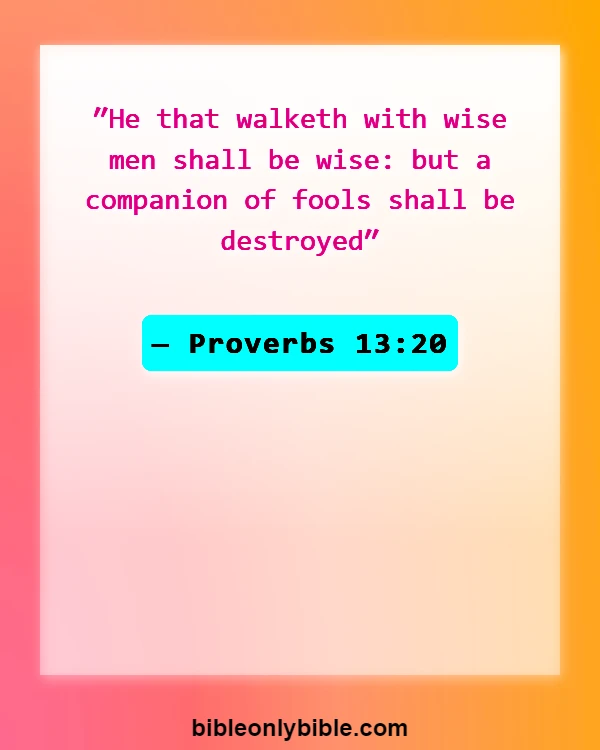
He that walketh with wise men shall be wise: but a companion of fools shall be destroyed
Proverbs 13:20
Explanation:- God advises us to seek the company of the wise to gain wisdom and avoid the ruin that comes from associating with fools. Engaging in arguments with fools leads to frustration and strife, while walking with the wise fosters growth and understanding.
Proverbs 29:11 – Wise restraint over foolish expression

A fool uttereth all his mind: but a wise man keepeth it in till afterwards
Proverbs 29:11
Explanation:- This verse highlights the wisdom of exercising self-control and restraint. Engaging in arguments with fools often leads to fruitless disputes. God advises against such interactions to protect us from unnecessary conflict and to encourage a focus on understanding and wisdom instead.
Proverbs 15:2 – Wise use knowledge, fools spread folly

The tongue of the wise useth knowledge aright: but the mouth of fools poureth out foolishness
Proverbs 15:2
Explanation:- The verse highlights the contrast between the wise and the foolish. It advises that while the wise use their knowledge constructively, fools recklessly spread nonsense. This underscores God’s guidance to avoid pointless arguments, as engaging with fools only perpetuates their folly.
2 Timothy 2:14 – Avoid quarrels; focus on truth and edification

Of these things put them in remembrance, charging them before the Lord that they strive not about words to no profit, but to the subverting of the hearers
2 Timothy 2:14
Explanation:- Instructs believers to focus on truth and edification, warning against pointless arguments that lead to strife. Engaging with fools often results in fruitless debates. God urges us to prioritize constructive dialogue that builds up rather than tears down.
Biblical Wisdom for Dealing with Difficult People
In our journey, we’re bound to encounter challenging individuals. The Bible offers profound wisdom in dealing with such situations, encouraging kindness and patience even when it’s tough. By leaning on these teachings, we can maintain our integrity and reflect Christ’s love, no matter the circumstances we face.
Romans 12:18 – Live peacefully with everyone, if possible

If it be possible, as much as lieth in you, live peaceably with all men
Romans 12:18
Explanation:- This verse encourages us to strive for peace in all our relationships, acknowledging that it isn’t always possible. It aligns with the wisdom of avoiding fruitless arguments with fools, highlighting the importance of patience and discernment in dealing with difficult individuals.
Colossians 3:13 – Forgive others as the Lord forgave you

Forbearing one another, forgiving one another, if any man have a quarrel against any: even as Christ forgave you, so also do ye
Colossians 3:13
Explanation:- This verse encourages patience and forgiveness when dealing with difficult individuals, highlighting the importance of showing grace as we have received it. By practicing forgiveness, we can avoid futile arguments with those unwilling to reason, fostering peace and understanding.
Ephesians 4:2 – Humility, gentleness, patience, love, and bearing with others
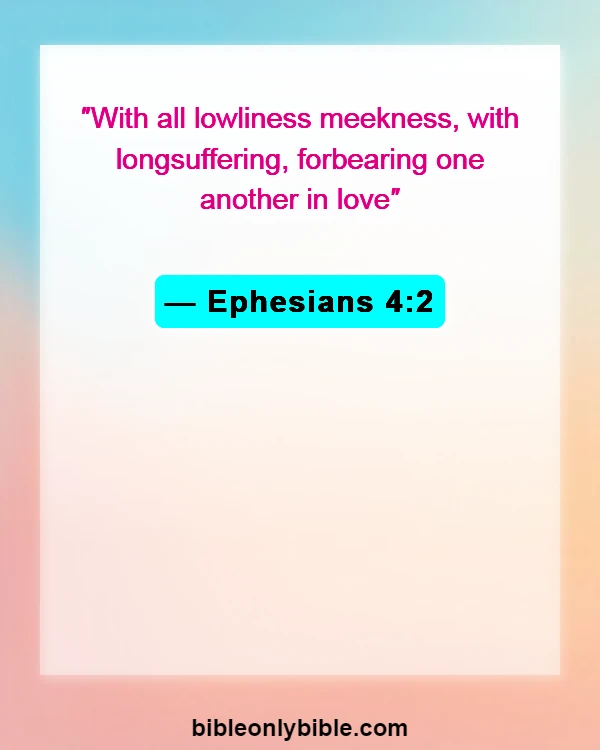
With all lowliness meekness, with longsuffering, forbearing one another in love
Ephesians 4:2
Explanation:- This verse encourages us to approach difficult interactions with humility, gentleness, and patience. By embodying love and bearing with others, we can navigate challenging relationships wisely, avoiding fruitless arguments and fostering peace, reflecting Christ’s example in our conduct.
Matthew 5:44 – Love and pray for your enemies

But I say unto you, Love your enemies, bless them that curse you, do good to them that hate you, pray for them which despitefully use you, persecute you
Matthew 5:44
Explanation:- This verse encourages us to respond to difficult people with love and prayer, rather than engaging in arguments or hostility. By loving our enemies and praying for them, we rise above conflict and demonstrate the transformative power of compassion and grace.
Proverbs 15:1 – Gentle response calms, harsh words provoke anger

A soft answer turneth away wrath: but grievous words stir up anger
Proverbs 15:1
Explanation:- A gentle response can diffuse tension and foster understanding, preventing conflicts from escalating. In contrast, harsh words can provoke anger and exacerbate disagreements. Applying this wisdom helps navigate interactions with difficult people, promoting peace and constructive dialogue instead of unnecessary arguments.
When Should Christians Choose Silence Over Debate?
Choosing silence can sometimes be the most powerful response. As Christians, we’re called to discern when our words will make a positive impact and when they may only fuel discord. Embracing silence at the right moments demonstrates maturity and wisdom, allowing God’s peace to guide our actions and words.
James 1:19 – Be quick to listen, slow to speak

Wherefore, my beloved brethren, let every man be swift to hear, slow to speak, slow to wrath
James 1:19
Explanation:- This verse encourages Christians to prioritize listening and patience over hasty speech. In situations where arguments might arise, it advises choosing silence and understanding over engaging in fruitless debates, especially with those who are not receptive, embodying wisdom and self-control.
Ecclesiastes 3:7 – Time for silence, time to speak

A time to rend, a time to sew; a time to keep silence, a time to speak
Ecclesiastes 3:7
Explanation:- Choosing silence over debate is often wise, especially when engaging with those who may not be receptive to truth. Discernment helps us recognize when our words would be fruitless, allowing us to maintain peace and reflect Christ’s wisdom through our actions instead.
Psalm 141:3 – God guards our words, choose silence wisely

Set a watch, O Lord , before my mouth; keep the door of my lips
Psalm 141:3
Explanation:- In moments of conflict, it’s wise for Christians to seek divine guidance to guard their words. Choosing silence over debate with a fool can reflect wisdom and restraint, allowing God’s peace to prevail over unnecessary arguments.
Proverbs 21:23 – Guard your words to avoid trouble
Whoso keepeth his mouth his tongue keepeth his soul from troubles
Proverbs 21:23
Explanation:- Choosing silence over debate can prevent unnecessary conflict. This verse advises Christians to be cautious with their words, highlighting that restraint can help avoid trouble, especially when engaging with those who are not receptive to wisdom.
Practical Applications of These Bible Verses in Daily Life
Applying these biblical principles daily can transform our interactions. By choosing our battles wisely and engaging in constructive dialogues, we foster peace and understanding. Let’s incorporate this wisdom into our conversations, ensuring they are filled with grace and love, reflecting our commitment to live as Christ taught us.
Philippians 4:5 – Let your gentleness be evident to all

Let your moderation be known unto all men. The Lord is at hand
Philippians 4:5
Explanation:- This verse encourages us to embody gentleness, especially when dealing with challenging individuals. In situations where arguing with a fool is tempting, responding with calmness and kindness reflects our faith and can defuse tension, promoting peace and understanding in daily interactions.
Colossians 4:6 – Speak graciously, seasoned with wisdom
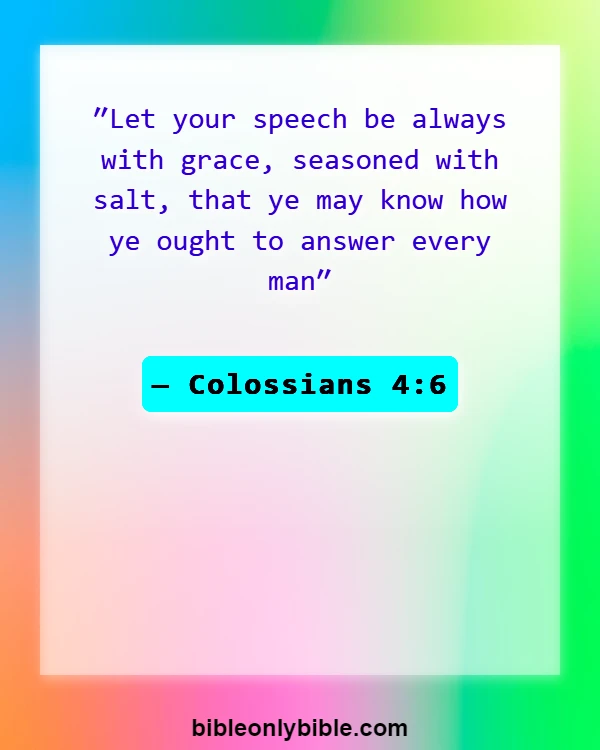
Let your speech be always with grace, seasoned with salt, that ye may know how ye ought to answer every man
Colossians 4:6
Explanation:- This verse encourages speaking with grace and wisdom, highlighting the importance of thoughtful communication. In daily life, it reminds us to engage in conversations that uplift and inform, avoiding fruitless arguments, especially with those unwilling to listen or learn.
1 Peter 3:15 – Defend faith with gentleness and respect

But sanctify the Lord God in your hearts: be ready always to give an answer to every man that asketh you a reason of the hope that is in you with meekness fear
1 Peter 3:15
Explanation:- Defend your faith thoughtfully and respectfully, even when faced with foolish arguments. Approach discussions with kindness and calmness, reflecting Christ’s character. This practice not only strengthens your own faith but also exemplifies Christian virtues, fostering understanding and avoiding unnecessary conflict.
Galatians 5:22-23 – Cultivate the Spirit’s fruits: love, joy, peace, patience

But the fruit of the Spirit is love, joy, peace, longsuffering, gentleness, goodness, faithMeekness, temperance: against such there is no law
Galatians 5:22-23
Explanation:- Galatians 5:22-23 encourages embodying virtues like love, joy, peace, and patience, which can guide interactions and prevent futile arguments. By nurturing these qualities, you can wisely avoid engaging in conflicts with those who prefer folly, fostering harmony and understanding in daily life.
Proverbs 16:24 – Kind words bring healing and sweetness

Pleasant words are as an honeycomb, sweet to the soul, health to the bones
Proverbs 16:24
Explanation:- Kind words soothe and uplift, offering peace in challenging situations. In daily life, choosing gentle speech over engaging with foolish arguments fosters understanding and harmony. This approach reflects wisdom and nurtures positive relationships, aligning with biblical teachings to promote healing and sweetness.
James 3:17-18 – Wisdom is pure, peace-loving, considerate, and sincere
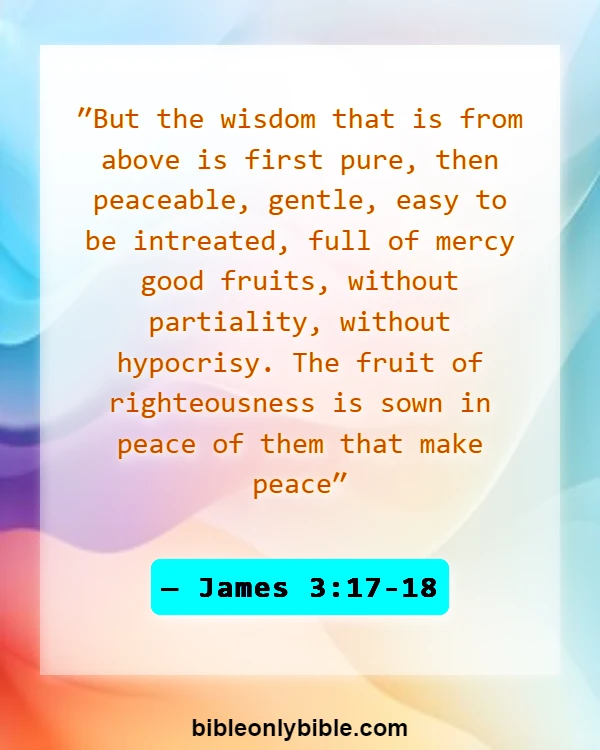
But the wisdom that is from above is first pure, then peaceable, gentle, easy to be intreated, full of mercy good fruits, without partiality, without hypocrisyAnd the fruit of righteousness is sown in peace of them that make peace
James 3:17-18
Explanation:- This passage highlights the qualities of true wisdom, which include purity, peace, and sincerity. In daily life, applying these qualities helps us avoid pointless arguments and fosters harmonious relationships, encouraging us to respond thoughtfully rather than engaging in disputes with those who act foolishly.
